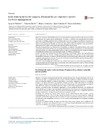Please use this identifier to cite or link to this item:
https://accedacris.ulpgc.es/jspui/handle/10553/48459
| Title: | Real waiting times for surgery: proposal for an improved system for their management | Other Titles: | Los tiempos de espera reales en cirugía. Propuesta de un sistema mejoradopara su gestión | Authors: | Abásolo, Ignacio Barber Pérez, Patricia Lucía González López-Valcárcel, Beatriz Jiménez, Octavio |
UNESCO Clasification: | 531207 Sanidad | Keywords: | Listas de espera Sistema sanitario español |
Issue Date: | 2014 | Publisher: | 0213-9111 | Journal: | Gaceta Sanitaria | Abstract: | Objectives: In Spain, official information on waiting times for surgery is based on the interval between the indication for surgery and its performance. We aimed to estimate total waiting times for surgical procedures, including outpatient visits and diagnostic tests prior to surgery. In addition, we propose an alternative system to manage total waiting times that reduces variability and maximum waiting times without increasing the use of health care resources. This system is illustrated by three surgical procedures: cholecystectomy, carpal tunnel release and inguinal/femoral hernia repair. Methods: Using data from two Autonomous Communities, we adjusted, through simulation, a theoretical distribution of the total waiting time assuming independence of the waiting times of each stage of the clinical procedure. We show an alternative system in which the waiting time for the second consultation is established according to the time previously waited for the first consultation. Results: Average total waiting times for cholecystectomy, carpal tunnel release and inguinal/femoral hernia repair were 331, 355 and 137 days, respectively (official data are 83, 68 and 73 days, respectively). Using different negative correlations between waiting times for subsequent consultations would reduce maximum waiting times by between 2% and 15% and substantially reduce heterogeneity among patients, without generating higher resource use. Conclusion: Total waiting times are between two and five times higher than those officially published. The relationship between the waiting times at each stage of the medical procedure may be used to decrease variability and maximum waiting times | URI: | https://accedacris.ulpgc.es/handle/10553/48459 | ISSN: | 0213-9111 | DOI: | 10.1016/j.gaceta.2013.10.011 | Source: | Gaceta Sanitaria[ISSN 0213-9111],v. 28, p. 215-221 |
| Appears in Collections: | Artículos |
SCOPUSTM
Citations
10
checked on Jun 8, 2025
WEB OF SCIENCETM
Citations
9
checked on Feb 8, 2026
Page view(s)
88
checked on Oct 12, 2024
Download(s)
97
checked on Oct 12, 2024
Google ScholarTM
Check
Altmetric
Share
Export metadata
Items in accedaCRIS are protected by copyright, with all rights reserved, unless otherwise indicated.
